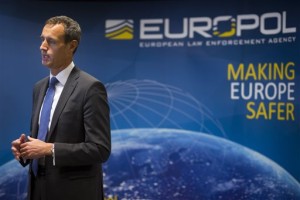French, German, and Belgian police arrested more than two dozen suspects in anti-terrorism raids Friday, as European authorities thwarted potential attacks by people linked to Islamic extremists.
But the combination of a large number of radicalized Muslim extremists across Europe, their lack of command structure, and growing sophistication make it “extremely difficult” for law enforcement agencies to foil every terror attack, said Rob Wainwright, head of European Union police agency Europol.
“The scale of the problem, the diffuse nature of the network, the scale of the people involved make this extremely difficult for even very well-functioning counterterrorist agencies such as we have in France to stop every attack,” he said.
At least 2,500 and possibly up to 5,000 suspects have traveled from Europe to conflicts in Syria and Iraq, he added.
In a grim assessment by the man who leads efforts to coordinate crimefighting across the European Union, Wainwright said the threat is evolving as cells controlled by a clear commander have been replaced by “thousands of independent actors or semi-independent terrorist suspects” who are difficult to track.
“That’s the real problem I think that the intelligence community faces right now,” he said.
19,000 French websites under attack since Charlie Hebdo shootings
Hackers have targeted 19,000 French websites since an attack by Islamic extremists left 10 dead last week, said Arnaud Coustilliere, head of cyberdefense for the French military. Some carried out by well-known Islamic hacker groups.
“What’s new, what’s important, is that this is 19,000 sites. That’s never been seen before,” Coustilliere said. “This is the first time that a country has been faced with such a large wave.”
Among the groups suspected of launching the attacks, French officials named Middle East Cyber Army (MECA), Fallaga team and Cyber Caliphate.
Coustilliere called the attacks a response to the massive demonstrations against terrorism that drew 3.7 million people into the streets across France on Sunday. He pointed to “structured groups” that used tactics like posting symbols of jihadist groups on companies’ Web sites.
Two of the Paris terror attackers claimed allegiances to al-Qaida in Yemen and a third to the Islamic State group.
Reports compiled with information from The Associated Press
 CGTN America
CGTN America The head of the European police agency Europol, Rob Wainwright, right, answers questions during an interview in The Hague, Netherlands, Friday, Jan. 16, 2015. (AP Photo/Peter Dejong)
The head of the European police agency Europol, Rob Wainwright, right, answers questions during an interview in The Hague, Netherlands, Friday, Jan. 16, 2015. (AP Photo/Peter Dejong)
